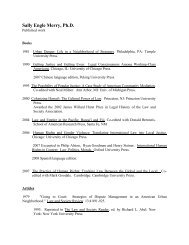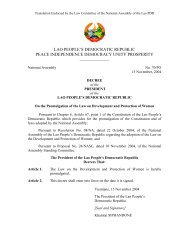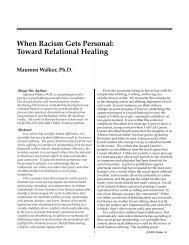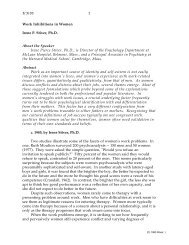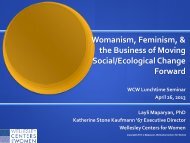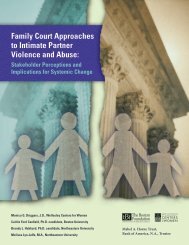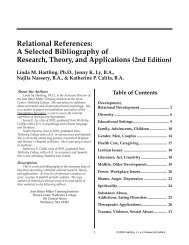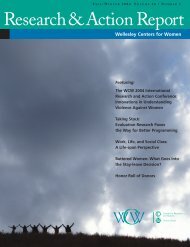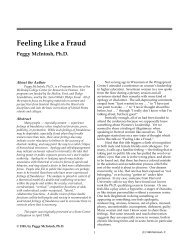Download PDF - Wellesley Centers for Women
Download PDF - Wellesley Centers for Women
Download PDF - Wellesley Centers for Women
You also want an ePaper? Increase the reach of your titles
YUMPU automatically turns print PDFs into web optimized ePapers that Google loves.
16<br />
Commentary<br />
Forced Choices, False Choices<br />
Jean Baker Miller, M.D., is the<br />
founding director of the Jean Baker Miller<br />
Training Institute at the <strong>Wellesley</strong> <strong>Centers</strong> <strong>for</strong><br />
<strong>Women</strong> (WCW). She served as the first<br />
director of the Stone Center at WCW from<br />
1981 to 1984. A practicing psychiatrist<br />
and psychoanalyst <strong>for</strong> more than 40<br />
years, Miller authored Toward a New<br />
Psychology of <strong>Women</strong> (Boston, Beacon<br />
Press, 1976), a book which has<br />
become a classic in its field.<br />
Celebrating its 30 th year on book<br />
shelves, Toward a New Psychology of<br />
<strong>Women</strong> has been translated into<br />
more than 20 languages and was<br />
reissued in a second edition in 1987.<br />
Miller is also co-author of The Healing<br />
Connection (Boston, Beacon Press, 1997)<br />
which she wrote with Irene Stiver, Ph.D. She<br />
co-authored <strong>Women</strong>’s Growth in Connection<br />
(Guild<strong>for</strong>d Press, 1991), served as editor of<br />
Psychoanalysis and <strong>Women</strong> (New York,<br />
Brunner-Mazel and Penguin Books, 1973),<br />
and wrote or contributed to numerous<br />
papers in professional journals on the psychology<br />
of women, depression, and the<br />
study of dreams. These books, with the<br />
exception of Psychoanalysis and <strong>Women</strong>,<br />
can be purchased through the WCW<br />
publications office: 781.283.2510.<br />
Recent months have brought us a drum beat of<br />
articles and books telling us of affluent, highly<br />
educated women who have left work to return<br />
to fulltime motherhood. They attest to the<br />
impossibility of solving the problem of mother-<br />
hood and serious work—of doing them both<br />
well and fruitfully under present conditions.<br />
Note that these are our most advantaged<br />
women, those with partners in the upper mid-<br />
dle class or higher. Less affluent women cannot<br />
make this choice. They cannot walk off the job.<br />
I remember pondering this dilemma in 1976,<br />
when I was writing Toward a New Psychology of<br />
<strong>Women</strong>. I thought then, “If a society wants chil-<br />
dren, it should make proper provision <strong>for</strong><br />
them.” It should not be left <strong>for</strong> women alone to<br />
solve. I do not mean only that men should<br />
“pitch in” but that societies need to build a<br />
whole viable context of relationships and<br />
arrangements that can support parents in this<br />
endeavor. We should not and do not need to<br />
<strong>for</strong>ce women to solve a problem that is insolu-<br />
ble by the individual alone.<br />
For parents we can think of alternatives. Life<br />
is long today. There is time to devote to child<br />
raising if we choose to do it and still we will<br />
have a lot of life left to do other valuable<br />
work—but only if employers don’t penalize<br />
people <strong>for</strong> it. There are all kinds of arrange-<br />
ments that could be created and they can<br />
change as children get older and need less care.<br />
Everyone would benefit—women, men, chil-<br />
dren, businesses, society. Why should anyone<br />
be penalized?<br />
Changes to be made are many, not the least<br />
are attitudes, as well as time and schedule<br />
improvements. As just one example, many<br />
women have managed to come back to work<br />
after varying amounts of time raising children<br />
full- or part-time. Often they still face the stig-<br />
ma of being on the “mommy track” and are<br />
not considered serious workers. In reality, par-<br />
ents often bring new and fresh ideas, learned<br />
through parenting, to the job which may<br />
enhance the work environment.<br />
To create a society that would provide much<br />
fuller lives <strong>for</strong> women, men, and children<br />
would not be so difficult. What is difficult is to<br />
convince the culture to do it. We are often<br />
locked into <strong>for</strong>ced and false choices without<br />
recognizing it, likely because we are so accus-<br />
tomed to thinking this way. These appear to be<br />
the only options, but we can easily think of<br />
many others. While major change in societal<br />
arrangements will take much hard work, many<br />
benefits follow from refusing false choices. The<br />
search <strong>for</strong> alternative arrangements stimulates<br />
us to think in new ways be<strong>for</strong>e we can accom-<br />
plish the necessary changes. When <strong>for</strong>ced to<br />
chose between only two options—being a full-<br />
time parent or full-time worker—we run the<br />
risk of feeling like failures. This is because nei-<br />
ther one of the options is good enough. This<br />
sense of failure causes despair—a profound<br />
lack of hope about the whole thing, as is<br />
happening today to some women who<br />
struggle with the demands of both work and<br />
motherhood. Thus, we are always blaming our-<br />
selves and feeling inadequate. We believe it is<br />
our own fault. These feelings result in us<br />
becoming discouraged about ourselves instead<br />
of valuing those things we do manage to<br />
accomplish—often against <strong>for</strong>midable odds.<br />
Ridding ourselves of these burdens can help to<br />
sustain us while we work to accomplish all of<br />
the major changes we truly need.<br />
<strong>Women</strong> have made tremendous strides in<br />
advancing our options. We don’t want to get<br />
bogged down now. We can find our way out of<br />
these <strong>for</strong>ced choices. Society needs to help<br />
women, men, and families find new, multiple-<br />
choice alternatives today.<br />
Research & Action Report | Spring/Summer 2006 17



